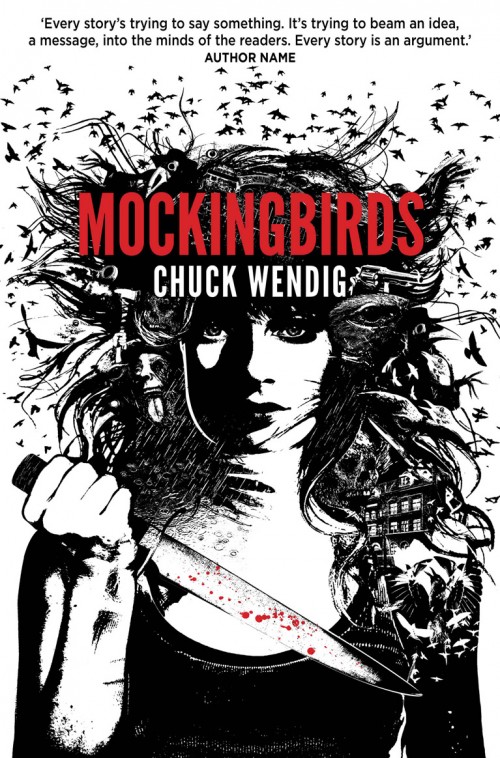Today we have Chuck Wendig with his new horror novel Mockingbird from Angry Robot. From page one, he gives you vivid dialogue and a view into someone who is deeply unhappy. She can, after all, see when and how someone is going to die if she touches them. Being a horror novel, her life goes downhill from there. That’s not a spoiler.
So what’s his favorite bit?
CHUCK WENDIG:
I don’t get freaked out easily with fiction.
I’ve been reading horror and its relative ilk for the last 20 years. From gore-caked atrocities to sneaky-subtle creep, it’s hard to get under my skin.
 It’s doubly difficult for me to get under my own skin. In part because, hey, as it turns out, I own my brain. I know what it’s thinking because it is me and I am it. It’s like tickling yourself: it just doesn’t work right.
It’s doubly difficult for me to get under my own skin. In part because, hey, as it turns out, I own my brain. I know what it’s thinking because it is me and I am it. It’s like tickling yourself: it just doesn’t work right.
And yet, there exists a chapter in my new Miriam Black book, Mockingbird, that crawled up under my skin when I wrote it, and still makes me twitch and shift in my seat when I read it. It’s like it got under there and laid eggs. Then hatched a hundred little freak-babies that squirm there still.
In this scene, Miriam’s on-again off-again nice-but-damaged-boyfriend-dude Louis is driving his truck when he spies a “broken crayon” – slang for a car wreck or abandoned vehicle.
Now, all along in both Blackbirds and Mockingbird I treat the audience to sequences that are dreams or hallucinations and seem to very plainly be that—sometimes they may appear to be something else at the fore but then by the end, we know that “Okay, this was just a dream. Maybe a psychic dream, maybe a dream with meaning, but a dream just the same.”
But this scene with Louis violates that. It shifts uncomfortably between what seems to be reality and what seems to be a dream and never quite settles on either.
Louis gets out of his truck and sees—
The whole road, blanketed with birds. Blackbirds. Starlings. Grackles. Crows. Shifting uneasily. Claws clicking on asphalt. Click click. Click click
Beaks pointed away from him.
Eyes pointedtoward him.
Some of them murmur. Or caw. Or make a low chirrup in the backs of their throats. He thinks, any minute, any one of these birds could come at him. Or hell, all of them at once—wings and beaks and talons. A fear runs through him, a fear in which the birds swarm and come for his face and he loses his last remaining eye, leaving him blind and in the dark forever.
Oh, did I mention Louis has only one eye? Louis has only one eye. In the kingdom of the blind, the one-eyed-man is king, until that king gets his one good eye plucked out by an angry bird.
These birds teach Louis something. They warn him, quite literally, with a human voice. And then he’s suddenly back in his truck as if it never happened—again a signal that the dream is over, that reality has once more resumed, thank you very much.
But! Is it done? Because—
It’s then he feels it: an itching sensation.
Behind the eyepatch. Normal itching, he thinks. Like whenever he thinks about Miriam. He lifts the patch. Scratches beneath it.
But the itching gets worse. It burns.
Five miles later he pulls off at an exit, finds a gas station, and parks the truck.
He flips the patch like a mailbox lid and starts going to town on the fleshy eyeless pucker—scratch scratch scratch—until suddenly his index finger brushes against something sharp. Something sticking out of the hole.
A sick feeling shoots through him.
He pinches his fingers. Feels for whatever it is.
Begins pulling it out.
He feels something wet brush against the sides of his sockets, and then he feels a horrible feeling like a thing moving through him, out of him—
It’s a feather. A wet, blood-slick feather.
But he’s not done. He keeps pulling because there’s more, more, more.
Hair. Wet hair. Wound around the far end of the feather. It smells strong, fetid, like—
Like river water.
Did I mention that Louis’ wife drowned in a river? Louis’ wife drowned in a river.
He pulls out the feather and the hair and then throws up.
But that doesn’t seem to be real, either. So, what is it? What’s happening? A continued hallucination? A shared dream? A shifting, unstable reality? I don’t know. I still don’t know. And I think maybe that’s the secret to scaring ourselves or affecting ourselves at all with our fiction:
The power lies in not knowing.
RELEVANT LINKS:
BIO:
Chuck Wendig is a novelist, screenwriter, and game designer. He’s the author of BLACKBIRDS, MOCKINGBIRD and DINOCALYPSE NOW, and is co-writer of the short film PANDEMIC, the feature film HiM, and the Emmy-nominated digital narrative COLLAPSUS. He lives in Pennsylvania with wife, taco terrier, and tiny human.”


But that doesn’t seem to be real, either. So, what is it? What’s happening? A continued hallucination? A shared dream? A shifting, unstable reality? I don’t know. I still don’t know. And I think maybe that’s the secret to scaring ourselves or affecting ourselves at all with our fiction:
The power lies in not knowing.
I think you have a point, Chuck. The ambiguity is frightening.
Well, that’s the trick, innit? The unknown is always far freakier than the known. Thanks, Paul!
— c.
Fear of the unknown is one of the strongest fears. The best example of this is H.P. Lovecraft’s “The Music of Erich Zann”, so much that I cannot give a description to do it justice.